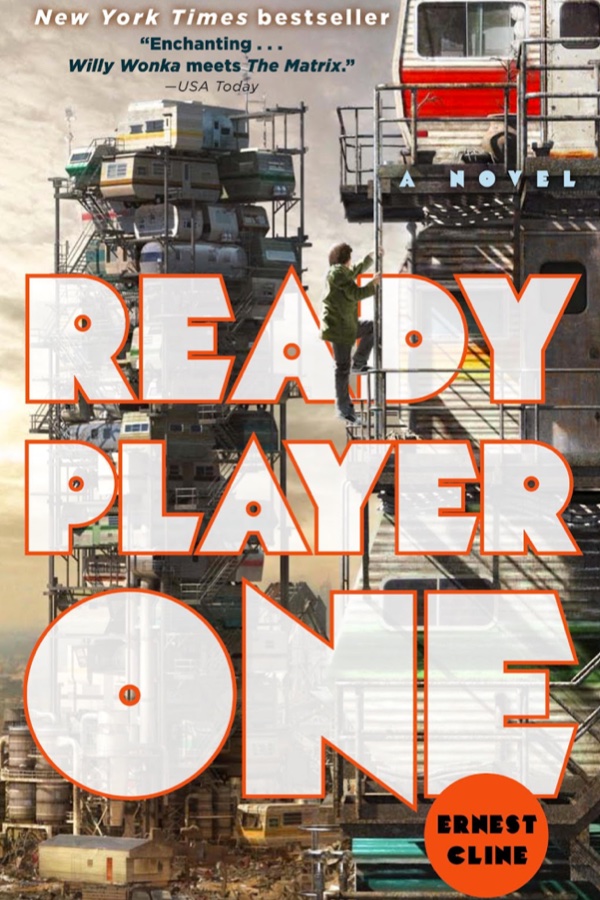Great Scott! By the power of Grayskull! W.o.W! Eureka! Most wondrous strange!
This book is fun. And yes, it revels in obscure ‘80s gamer trivia right alongside modern MMORPGs, Shakespeare, and classical languages.
(That was Back to the Future, He-Man, World of Warcraft, Archimedes, and Shakespeare, by the way.)
Ready Player One is about a misfit gamer geek orphan living in a dystopian America more than slightly reminiscent of George Orwell’s 1984. The world is falling apart, WALL-E style, and Big Brother, here known as Innovative Online Industries, is slowly taking control of universal happiness. Said universal happiness resides in the OASIS, or Online Anthropomorphic Sensory Immersive Simulation. (Read enormous online video game. Like, really enormous. Like, everyone everywhere in the whole world plays it to escape the aforementioned dystopian existence. Totally rad.) The creator of OASIS has bequeathed his considerable fortune to the winner of a contest within the game. The only requirements are a free account, obsession with the ‘80s, and the ability to play video games really, really well. As it turns out, real friendship and love of the underappreciated, not to mention familiarity with classical language and literature, are also essential.
Our hero is Wade O. Watts. Notice the W.o.W. and the superhero identity alliteration. Questing under the avatar name Parzival, he becomes friends with two American teenagers (with the avatar names Art3mis and Aech) and two Japanese gamers (with the avatar names Daito and Shoto). Obviously Wade defeats the supervillain and saves the day. Which, as I said at the beginning, is fun. But there is a bit more to this story than the fun or the obvious…
I think this book attempts to strike a crucial balance: the balance between the old and the new, the prudent and the impulsive, the familiar and the strange, the traditional and the revolutionary. Wade and his peers love games that were written fifty years before, and books that were written five hundred years ago, as well as the most modern storylines. They revere the creativity and artistry that the pioneer game designers had to exercise, as well as revelling in the intricacies and subtleties of the latest technologies. They do not hesitate to call out those who devalue or cheapen either the old or the new.
Admittedly, the book sometimes fails. There is crude and occasionally profane language. The protagonist(s) have a cynical and dismissive attitude towards God and religion. There are many places where it seems that a political agenda has been inserted for commercial pandering. There are one or two sexual references, and one two-page reflection on sexual topics that might be unsettling. A revelatory moment in the book is connected with sexual orientation concepts. These are not easy topics and not for immature readers.
On the other hand, many of these apparent red flags may prove to be insights, properly viewed. For what it’s worth, many if not all of the above red flags appear in Shakespeare, too. In Ready Player One, the cynicism about religion is presented as a side effect of isolated experience. The apparent insertions of political agendas fit admirably into the dystopian framework, and encourage even further comparison to Orwell’s classic novel. The takeaway from the sexual reflections is disillusionment with internet fantasy and failed attempts at reconnection to real relationships. The revelatory moment mentioned above is focused on the importance of love. Rare in the current pop culture, the authentic, intimate relationships in Ready Player One are not based on sex. Again, these are not easy topics and not for immature readers.
The pros, in my opinion, far outweigh the cons. The book affirms the value of online social interaction as a step in the right direction if you’re living in a dystopia, but that reality is still best. Both in OASIS and the real world, the driving motivation of the protagonist(s) is connection with people who love and understand them. Parzival (note Grail legend reference) and Art3mis (note classical mythology reference) wrestle with the idea that their real world selves may not be compatible with their online personas. In the end, they discover that their desire for reality led them to choose avatars that only slightly differed from their real appearances. The author also decries those who choose avatars that are overly macho or sexualized. Belief in loyalty, courage, and study (even tedious research) are central themes. The the team of friends wins primarily because Parzival chose Latin as a high school elective, and in part because Art3mis was well read in Shakespeare. A love of reading and research, as well as dedication to a cause, are common to all the friends. All gaming and pop culture aside, in the end, the message is clear: at some point you need to put down the game, go outside, get some fresh air, and talk to the people you truly love. Accept their flaws, love their goodness, and choose to give to them. If you don’t, it doesn’t matter how many XP you’ve earned or which Mega- Ultra- final boss you’ve conquered. You’ll lose the thing that is most precious in your life, even if you feel that gaming is an oasis.
For discussion:
- What does Wade/Parzival gain from online relationships? What does he lose?
- What does Wade/Parzival understand at the end that he did not before? What are some prejudices he still retains? What are some positive beliefs he still retains?
- What does Wade/Parzival value that is old? What does he value that is new? Are these values consistent with each other?
N.B. A movie rendition of this book, directed by Steven Spielberg, is set to be released in March 2018. It is one of those movies I will be reluctant to go see, just because the book is so imaginative that it is hard to imagine a movie capturing it truly.



